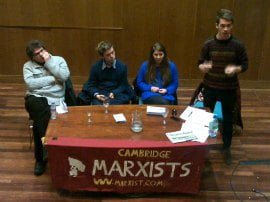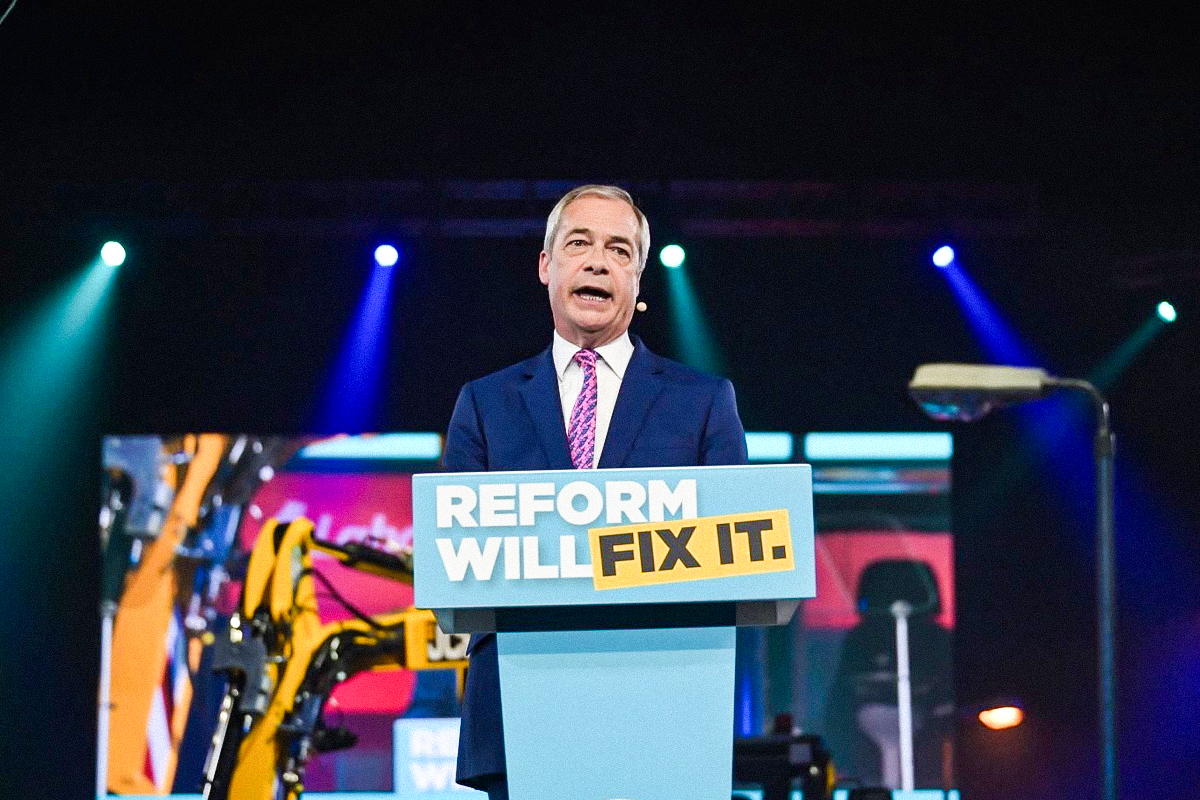On Tuesday 8th February, an event hosted by the Cambridge Marxist Discussion Group and the Cambridge Universities Labour Club attracted around 150 people for an evening of debate and discussion on alternatives to austerity, with a panel of speakers including Owen Jones, columnist at the Independent, George Owers, a Cambridge Labour Councillor, and Adam Booth, writer for Socialist Appeal.
On Tuesday 8th February, an event hosted by the Cambridge Marxist Discussion Group and the Cambridge Universities Labour Club attracted around 150 people for an evening of debate and discussion on alternatives to austerity, with a panel of speakers including Owen Jones, columnist at the Independent, George Owers, a Cambridge Labour Councillor, and Adam Booth, writer for Socialist Appeal.
[Scroll to the end of this article to hear audio recordings of the opening speeches and summaries from the three speakers.]
The discussion was opened by Owen Jones, columnist at the Independent, author of ‘Chavs: the demonization of the working class’, and member of the think-tank CLASS (the Centre for Labour and Social Studies). Owen highlighted the huge class divisions in society and spoke about the need for unity amongst all those suffering under a crisis they did not cause. Only in that way, he said, would the ruling class be forced to grant concessions to working people.
The contribution from George Owers, a Labour councillor in Cambridge, centred on the need for some cuts, but stated out that cuts under a Labour government would be more benevolent than cuts under a Tory coalition. George rejected the idea that working people might be willing to actively mobilise against cuts, and insisted that local councillors should not simply refuse to make the cuts imposed by central government, but should instead try to negotiate less damaging austerity.
Adam Booth, a writer for Socialist Appeal, the Labour Party and Unite the Union, made clear that at a time of capitalist crisis, the ruling class is neither able to grant concessions to working people, nor impose a different, nicer kind of austerity. This is because these cuts are not ideological in nature, but are based on the necessity of keeping capitalism alive. The demands of working people are simple: a job, a house, free education, healthcare and other public services. However, we now find ourselves in a position where capitalism cannot afford these simple demands, or even the maintain the progressive reforms of the past. The only alternative, therefore, is to break with capitalism and transform society along socialist lines through the nationalisation of the main utilities and through Labour councillors, such as those in Hull, refusing to carry out the Coalition’s austerity.
The discussion that followed featured contributions from the floor on a wide range of topics. There was some discussion on whether the Labour Party would be the best vehicle by which to introduce socialist policies. The position was put forward many times, by from the panel and throughout the discussion, that as the only party in Britain with financial and historical ties to the trade unions, the Labour Party is the main political expression of the organised working class. However, it was also noted by Socialist Appeal supporters that it is not simply enough to demand socialist policies in the abstract from the Labour leaders, but that workers and youth need to actively get involved in the trade unions and the Labour Party in order to fight for a socialist programme.
Cambridge is home to huge numbers of international residents and students, and so, unsurprisingly, the discussion also branched out into questions relating to Spain, Greece and the EU. It was pointed out that international institutions such as the ECB (European Central Bank) and the IMF (International Monetary Fund) are at the forefront of the attacks on working people. This does not mean we should reject an internationalist stance, but rather that working people should unite to put forward an international alternative to global capitalism, an idea given concrete expression by the Europe-wide strike action that took place on 14th November 2012.
Socialist Appeal supporters from the Marxist society pointed out that there will be council elections in Cambridge next year and, if the current polls are anything to go by, George Owers and his fellow Labour councillors will be elected with majority on the Council. The only practical alternative to austerity is for councillors like George to refuse to implement cuts, and to build a mass movement in opposition to the Coalition, not just in Cambridge, but across the country where their actions will find an echo amongst working people everywhere. On the basis of this movement, workers and youth can fight to break from anarchy of capitalism and the crises that it causes, and struggle for a decent standard of living. Ultimately, it is socialism that presents the only real alternative to austerity.
It was generally agreed by the meeting that the discussion had been an interesting and useful exchange of ideas, conducted in a comradely manner. More events should be arranged between Labour clubs and Marxist societies up and down the country to discuss the best way to fight for ordinary people to fight back. On top of this it is vital that workers and youth get active and organised inside the labour movement, and that workers and students unite, in order to fight for a socialist programme, as Socialist Appeal supporters aim to do. Only through being an active part of the labour movement will we make the changes in society that all the speakers recognised were urgently needed.






